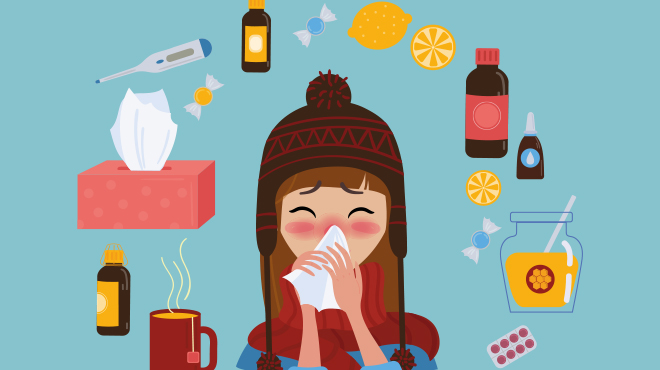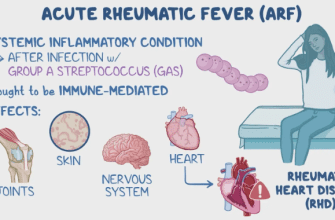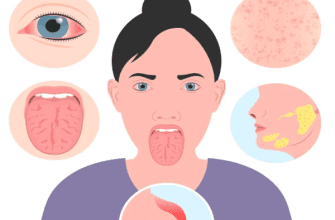What is the flu (influenza)?
Influenza, commonly known as the flu, is an infectious disease caused by influenza viruses.
What causes the flu?
The influenza virus causes flu. Influenza A, B and C are the most common types that infect people. Influenza A and B are seasonal (most people get them in the winter) and have more severe symptoms. Influenza C doesn’t cause severe symptoms and it’s not seasonal — the number of cases stays about the same throughout the year.
H1N1 (“swine flu”) and bird flu are both subtypes of influenza A.

Is the flu contagious?
Yes, the flu is contagious (it spreads from person to person). For every person infected, they spread the flu to one to two more people.
How does the flu spread?
The influenza virus spreads from direct or indirect contact with someone else who’s infected.
– From someone nearby coughing, sneezing or talking. Droplets can either get onto your hands or move through the air to get into your nose or mouth. The flu then moves into your lungs.
– By touching a surface that’s contaminated by the flu virus, then touching your face, nose, mouth or eyes. This includes things like door knobs, desks, computers and phones.
– By touching the hands or face of someone who has the flu, then touching your face, nose, mouth or eyes.
How long after exposure will I get the flu?
Incubation period – you’ll usually get symptoms of the flu one to four days after exposure
When is flu season?
Flu season — when cases of the flu go up dramatically — in the Northern Hemisphere (which includes the U.S.) is October through May. The highest number of cases (peak) usually happen between December and February.
What is the difference between the flu and the common cold?
The flu and the common cold can have similar symptoms, like runny nose and cough. But cold symptoms are usually mild and flu symptoms can be severe and lead to serious complications. Different viruses cause colds and the flu.
How do I know if I have the flu or COVID-19?
Since they have similar symptoms, the only way to know for sure if you have the flu or COVID-19 is to get tested. They both have a risk of serious illness. But different viruses cause these infections, and providers treat them with different medications.
Who is at higher risk for complications from the flu?
Certain health conditions can put you at higher risk for severe illness from the flu. This includes life-threatening complications that require hospitalization. You’re at higher risk for serious illness if you:
-Have asthma, COPD or another chronic lung disease.
-Have a history of kidney, liver, neurological, heart or blood vessels disease, including stroke.
-Are under 5 years old or over 65 years old.
-Are pregnant.
-Are under 19 years old and take aspirin regularly.
-Have a condition that causes issues with muscle function or makes it difficult to cough, swallow or clear fluids from your airways.
-Have diabetes.
-Have a weakened immune system (from HIV/AIDS, cancer or immunosuppressive medications).
-Have a blood disorder, like sickle cell disease.
-Have a BMI greater than 30 (have obesity).
-Live in a long-term care facility.
What are the symptoms of the flu?
-Fever.
-Chills.
-Body aches.
-Cough.
-Headache.
-Sore throat.
-Runny or stuffy nose (congestion).
-Tiredness or feeling run down.
-Diarrhea or vomiting (usually only in kids).
You may not have all of these symptoms


How is the flu diagnosed?
Your provider diagnoses the flu by listening to your symptoms and testing a sample of mucus from your nose. They’ll put a long stick with a soft tip (swab) in your nose to test for influenza. Results may take a few minutes or your provider may send the sample to a lab, where you’ll get results in a day or two.
What medications treat the flu?
-Oseltamivir phosphate (Tamiflu®).
-Zanamivir (Relenza®).
-Peramivir (Rapivap®).
-Baloxavir marboxil (Xofluza®)
Lifestyle and home remedies
-Drink plenty of liquids. Choose water, juice and warm soups to help keep fluids in your body.
-Rest. Get more sleep to help your immune system fight infection. You may need to change your activity level, depending on your symptoms.
-Consider pain relievers. Use acetaminophen (Tylenol, others) or ibuprofen (Advil, Motrin IB, others) for fever, headache or achiness associated with influenza. Children and teens recovering from flu-like symptoms should never take aspirin because of the risk of Reye’s syndrome, a rare but potentially fatal condition.
-To help control the spread of influenza in your community, stay home and keep sick children home until the fever is gone, without the use of medicine, for 24 hours. Unless you’re going to a medical appointment, avoid being around other people until you’re feeling better. If you need to leave your home to get medical care, wear a face mask. Wash your hands often.
Flu Vaccine
A number of flu vaccines will be available this season. These include:-injectable flu vaccines, or flu shots. These include:
- Flu shots that are made with inactivated influenza viruses.
- One flu shot that is made without influenza viruses.
-A live attenuated influenza vaccine, which is given by nasal spray.
When to get vaccinated against flu
-Most adults, especially those 65 years and older, and pregnant women in the first or second trimester should generally not get vaccinated early (in July or August) because protection may decrease over time. However, early vaccination can be considered for any person who is unable to return at a later time to be vaccinated.
-Some children need two doses of influenza vaccine. For those children, it is recommended that the first dose be given as soon as vaccine is available because the second dose needs to be given at least four weeks after the first. Vaccination during July and August also can be considered for children who need only one dose.
-Vaccination during July and August also can be considered for mothers who are in the third trimester of pregnancy, because this can help protect their infants for the first few months after birth (when they are too young to be vaccinated).
People who SHOULD NOT get a flu shot
-Children younger than 6 months of age are too young to get a flu shot.
-People with severe, life-threatening allergies to any ingredient in a flu vaccine (other than egg proteins) should not get that vaccine. This might include gelatin, antibiotics, or other ingredients.
-People who have had a severe allergic reaction to a dose of influenza vaccine should not get that flu vaccine again and might not be able to receive other influenza vaccines. If you have had a severe allergic reaction to an influenza vaccine in the past, it is important to talk with your health care provider to help determine whether vaccination is appropriate for you.







